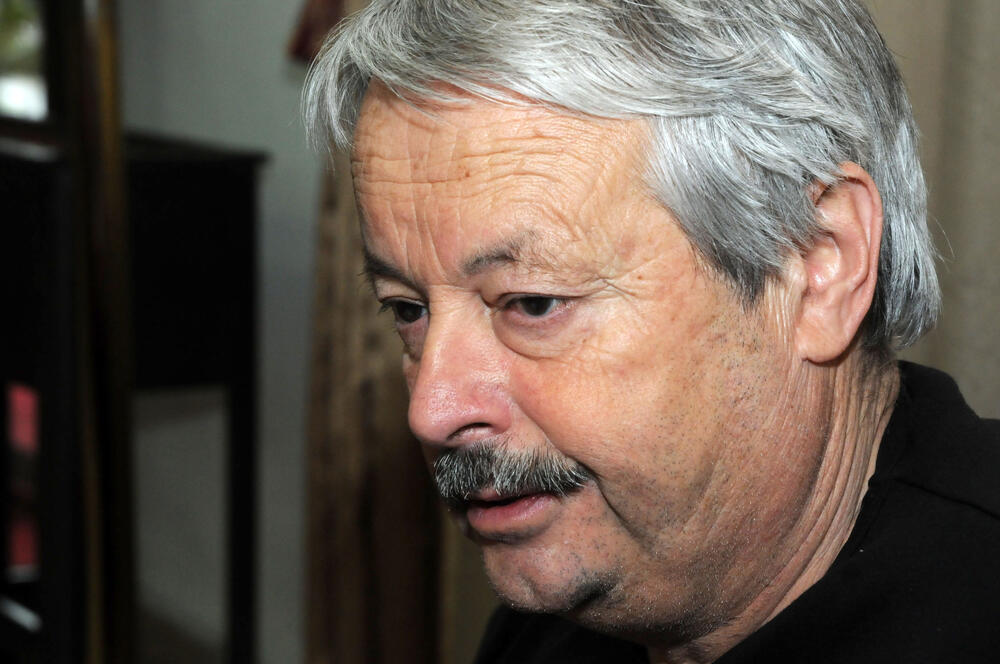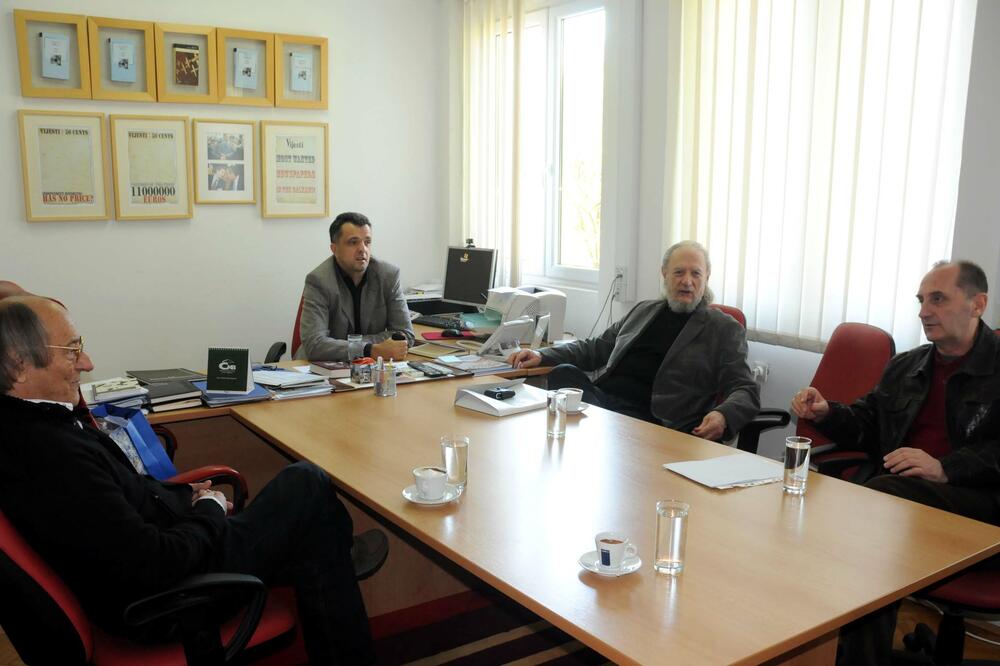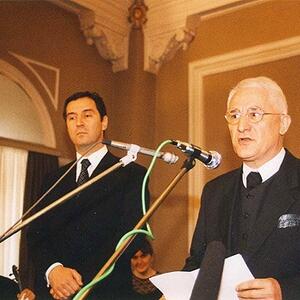(Continued from last Saturday)
The real name for the "new life" of Njegoš's award was the name of the writer who will be the first to be awarded after the break, and the first in Montenegro as an independent state. It is about Mirko Kovač, to the 2009 laureate.
A worthy start to a new award
The author of great novels, such as "The Door of the Womb" or "The City in the Mirror", is in many ways an emblematic figure of the twilight age of Yugoslav literature. The "traitor" driven out of Belgrade in 1991, found his peace in Rovinj, and continued to write with new strength and passion. He refused to play to the music of the power of the time, declaring that he belonged to Montenegrin, Bosnian, Serbian and Croatian literature. His condemnation of nationalism was complete and devastating. He and Philip David, as the last members of the famous friendship-literary circle (with By rain i Pekić), will be remembered as the most striking figures of resistance and disapproval of provincial frustrations and the spirit of the palanquin in the nineties of the XNUMXth century. Theirs also testifies to that Book of letters 1992-1995.
Kovač's marvelous language is woven from all possible language experiences that belong to this space, and as such is unique in the entire South Slavic cultural circle.
The award to Kovač (he was formally awarded for the book of stories "Roses for Nives Cohen") was unanimously welcomed by the public, although, as expected, with some ghostly echoes of the rhetoric that drove Kovač out of Belgrade in 1991. It seemed that the famous bg bazaar would "forgive" him for leaving ("Here, Đuro will forgive you for beating you"), but the fact that he found a home in Croatia was - unforgivable.
During his stay in Montenegro and in 2009, Kovač also visited the newsroom of Vijesti. In a pleasant short meeting with the leading people of the newspaper, it was clear how much this recognition meant to him. And, after everything that has happened since the nineties, he was particularly pleased with the fact that he was receiving the award in independent Montenegro. Since 1991, Kovač has often spoken for Montenegrin independent media such as Monitor and Liberal, and thanks to his circle of friends, he was very knowledgeable about local conditions. Two dramas were performed for him in the CNP, so all of these were reasons dear to him to come to Montenegro more often.
Good choices
And for the second life of Njegoš's award, it could be said that, as at the beginning, the first three awards are indisputable. As much as possible with literary awards, of course.
Great European (and Slovenian) poet Tomaž Shalamun was awarded in 2013. For people of my generation - who grew up in the XNUMXs with Šalamun's poetry but also with literary/media provocations, the very fact that a poet of that type of "social untamedness" but also radical aesthetic autonomy was awarded was good information about the current Njegoš award.
After that, the legal framework and propositions of the award were changed again - now it is arranged that the Njegoš award is awarded biennially, for the best book in a two-year period.
The next laureate will be in 2015 Miljenko Jergović for the novel "Rod". Jergović was 49 years old at the time of the award, and with the first winner Mihailo Lalic (1963, also 49 years old) is the youngest winner in the history of the Njegoš Award. It is interesting that you have more younger "Nobel winners" than winners of "Njegoš" - Kipling, Camus, Brodsky...
Jergović is one of the most important writers of his generation, a popular columnist, an author very present in the media, but above all a writer of exceptional imagination and skill. The award given to him did not encounter significant challenges.
However, this series of valid elections did not see a worthy continuation. And it could have been so.
Provincial operetta
In the post-Bećković period, the awarding of the Njegoš Award caused the greatest controversy Milorad Popović in 2017. Popović was awarded for the novel "Covjek bez lica", but it was uncomfortably clear that the prize was not won by the best book. Namely, that year, the candidate was Slobodan Schneider with the great novel "Age of Brass", and the literary public considered the writer of "Croatian Faust" to be the most likely candidate. But prizes do not always go to the best books, even though, as Schneider nicely emphasized in an interview, "there is no such prize that can make a book better".

An unusually composed jury (which included five authors whose books were published by Popović in Montenegro) made the decision it made. A significant detail - one of the members of the jury, a few years after this decision, was asked in an appropriate poll to make a list of the best books of Croatian (and world) literature in the first twenty years of the XNUMXst century - and on his list was Schneider's book "Age of Brass" which, as a member of the jury, he did not reward. Of course, he did not mention Popović's book in that survey.
The award-winning author made another, inadmissible, mistake: in numerous interviews and articles in sympathetic media, he fiercely defended - the decision of the jury. Although it simply does not belong to the laureate.
Part of the public also reacted to the fact that the award-winning writer was one of the main "commissars" in those years. Đukanović authorities in charge of culture, although his actions were mainly reduced to endless worried texts whose purpose was to make lists of traitors/enemies...
That award reminded many of the one from 1981. Not only that Bros, and Đukanović, it seems, had his own Vidmara...
New changes to propositions
The only member of the jury who in 2017, in the final selection, did not vote for Popović (but for the Macedonian classic Vlad Urošević), Jovica Acin he became the laureate of the next Njegoš award, in 2019, for the novel "Relatives". Vlada Urošević and Sinan Gudžević.
It was an award without scandal, but with very little media coverage... Aćin is a special writer, an important translator, a brilliant essayist, a great editor, in many ways a unique phenomenon in current Serbian and regional literature.
After that, there was another change of propositions. The latest law from 2019 brought it back to four years and explicitly, not implicitly, rewarding lifetime achievement.
The first prize for such propositions went, deservedly, to Dubravka Ugrešić, for the first time in the history of the award - posthumously.
With that, she became only the second woman winner of the Njegoš Award (after Desanke Maksimović). Certainly, that list from the marble slab in Billiards would look better if it were less macho, if it also had names on it, for example, Vesna Parun, or Svetlane Velmar Janković, Daše Drndić, Biljane Jovanović, Vide Ognjenović...
And ups and downs
You can also imagine what the list would look like with Black people instead Copic (1972) I will call you instead Daviča (1978) Zupanom or Kocbekom (both still alive in 1981, Kocbek actually dies in November of that year) instead of Vidmar, By rain instead of Desanka (1984), Konstantinović (or Tishmo) instead of Bećković (1997), with Šnajder instead of Popović (2017)... But the annals of the award are those who received it, not those who, for one reason or another, could not.
His reward is all that - both ups and downs, and the only thing that can be influenced are - future awards. And it is to be hoped that they will be devoid of controversies, at least the political ones, so common in the history of the most famous literary prize in the Balkans.
Many of the decisions of the numerous juries throughout the history of the Njegoš award are indisputable, and certainly, there were also those for whom this could hardly be said. But, in the end, it all is, or it can be read as a picture of a society in all its transformations and searches.
The award, in its duration, is an imprint of society, and always a true image. If not perfect literary taste, that of its time...
Bonus video:






